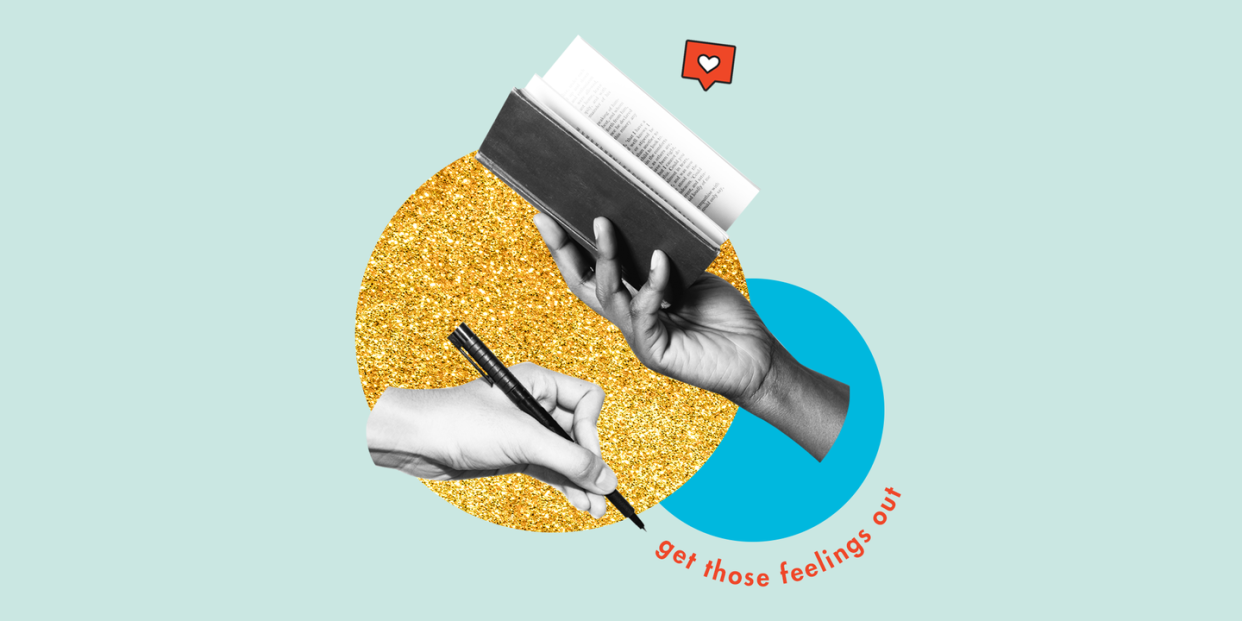8 Easy, Not-Stressful Things You Can Do Right Now to Feel Better

The whole world feels really chaotic right now. It's hard to focus on anything—your work, even a Netflix sesh—while your phone is constantly blowing up with apocalyptic push notifications and texts from anxious friends. Like the Cosmo team, hopefully you are able to hunker down at home for the next couple weeks and practice "social distancing" to help limit the spread of COVID-19. But canceling plans and hanging at your apartment can be lonely and, well, just plain weird, which is why we tapped a few mental health experts for tips on how to stay sane during these unprecedented times. Stay healthy and cozy out there, y'all.
Stay connected
Loneliness can have a very real impact on your mental health. "It's important to stay connected with family, friends, and co-workers, which helps prevent loneliness and reduce anxiety," recommends clinical psychologist and relationship coach Shelley Sommerfeldt, Psy.D. Luckily, technology makes staying in touch super easy, especially when you're holed up inside. To feel less isolated, FaceTime, text, email, or—yeah—even call your crew.
Communicating with yourself during this time is also important. Alyssa Petersel, LMSW (and founder and CEO of MyWellBeing), suggests journaling. "Practice curiosity and honesty with how you are truly feeling, because bottling up your feelings can heighten anxiety," says Petersel.
"Remember that you are not alone," adds therapist Lisa Marie Bobby, PhD, founder of the online therapy resource GrowingSelf.com. "Being isolated in your house makes it feel like you're an island, but everyone you know is likely going through the same thing."
We knowww you know—but in case you need another reminder ☝️ #rg @sarashakeel
A post shared by Cosmopolitan (@cosmopolitan) on Mar 11, 2020 at 7:17pm PDT
Focus on staying calm
"Meditation, mindfulness, exercise, and overall relaxation can help relieve your anxiety," says Sommerfeldt. Dedicate a few minutes every day to a relaxation regimen—try a yoga video on YouTube or download a meditation app. Eating well and getting a good night's snooze can also give you a sense of control over your health and destiny.
Do stuff that makes you happy
Choose something that you can reasonably do while you're social distancing, like cooking a recipe that always make you feel satisfied and cozy or watching your fave TV show. "Weave this activity into your work or day, where and when possible," advises Petersel. The next time you're feeling overwhelmed or stressed out or just stir-crazy, remember that you have this feel-good trick in your back pocket.
Get creative with how you socialize
Dominique Samuels, resident psychologist for the relationship wellness app Emi Couple, recommends finding things to do with your friends while you're physically apart. FaceTime while watching a new Netflix series with your BFF. Share your screen while you both online shop. If you have the patience (and happen to both own the same board game), you can even "play" together so long as you don't mind updating the board to reflect *both* your moves.
Keep your mind busy
Find positive distractions to give yourself a mental break from the news. Organize your closet, try a new craft project, or finish the book that's been hanging out on your nightstand for forever. "It really helps to take your mind off the matter at hand," recommends Sommerfeldt.
A post shared by Cosmopolitan (@cosmopolitan) on Mar 12, 2020 at 4:59pm PDT
Set boundaries with the news and social media
Sure, it's important to stay in-the-know during uncertain times like these. However, don't forget that receiving constant pings from anxious friends or alarming push notifications can be extremely overwhelming. Petersel recommends designating periods of offline time so your mind can "reset and reground."
Write down mantras that ground you
"Small reminders that help you recenter can make all the difference," says Petersel. She suggests writing down a few phrases and leaving them in spots around your apartment that you'll naturally interact with throughout your day.
Honey, unless you're a martini, keep walking 🍸 via @chunkbardey on Twitter
A post shared by Cosmopolitan (@cosmopolitan) on Feb 25, 2020 at 8:21pm PST
Structure your day so it feels as "normal" as possible
While you're working from home, "a routine that mirrors the office life's daily patterns and practices can be helpful," according to Katrina Gay, the National Director of Strategic Partnerships at the National Alliance on Mental Illness (NAMI). This means setting an early alarm to do a workout video if that's what you typically do during the week. As tempting as it is to pull your laptop into bed and work all day in your jammies, try to sit at a proper desk or table and throw on a bra. Take breaks regularly and eat lunch when you normally would. Resist the urge to do household chores or work late into the night. As much as you can, maintain your regular working hours.
You Might Also Like

